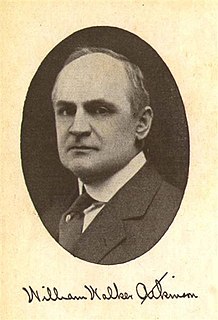A Quote by Friedrich Schiller
Satisfied if they themselves can escape from the hard labour of thought, they willingly abandon to others the guardianship of their thoughts.
Related Quotes
We are sending out thoughts of greater or less intensity all the time, and we are reaping the results of such thoughts. Not only do our thought-waves influence ourselves and others, but they have a drawing power - they attract to us the thoughts of others, things, circumstances, people, 'luck', in accord with the character of the thought uppermost in our minds.
The reaction against your own thought in itself lends life to thought. How this reaction is born is hard to describe, because it identifies with the very rare intellectual tragedies. The tension, the degree and level of intensity of a thought proceeds from its internal antinomies, which in turn are derived from the unsolvable contradictions of a soul. Thought cannot solve the contradictions of the soul. As far as linear thinking is concerned, thoughts mirror themselves in other thoughts, instead of mirroring a destiny.
Criticism is a study by which men grow important and formidable at very small expense. The power of invention has been conferred by nature upon few, and the labour of learning those sciences which may, by mere labour, be obtained, is too great to be willingly endured; but every man can exert some judgment as he has upon the works of others; and he whom nature has made weak, and idleness keeps ignorant, may yet support his vanity by the name of critic.
When a language begins to teem with books, it is tending to refinement; as those who undertake to teach others must have undergone some labour in improving themselves, they set a proportionate value on their own thoughts, and wish to enforce them by efficacious expressions; speech becomes embodied and permanent; different modes and phrases are compared, and the best obtains an establishment. By degrees one age improves upon another.
Patanjali said that when you are steadfast in your abstention of thoughts of harm directed toward yourself and others, all living creatures will cease to feel fear in your presence. Steadfast means you never slip. I think my mission is to support people in being steadfast in not having thoughts of harm - thoughts of judgment, worry, or hatred - directed toward themselves or others.
We have compassion because of the incredible pain and suffering which we as unenlightened beings cause to ourselves and all others through our ignorance. This is why we're trying to get out. This is why the bodhisattva has meaning. Because we're saying, no we won't get out, we won't escape until we've helped all other beings to escape, but most other beings don't even want to escape. They don't even know that there is an escape, and it's hard, so it's going to take an awfully long time.
The usual method of creation for most human beings is a three-step process involving thought, word, and deed or action. First comes thought; the formative idea; the initial concept. Then comes the word. Most thoughts ultimately form themselves into words, which are often then written or spoken. This gives added energy to the thought, pushing it out into the world, where it can be noticed by others. Finally, in some cases words are put into action, and you have what you call a result; a physical world manifestation of what all started with a thought.
































